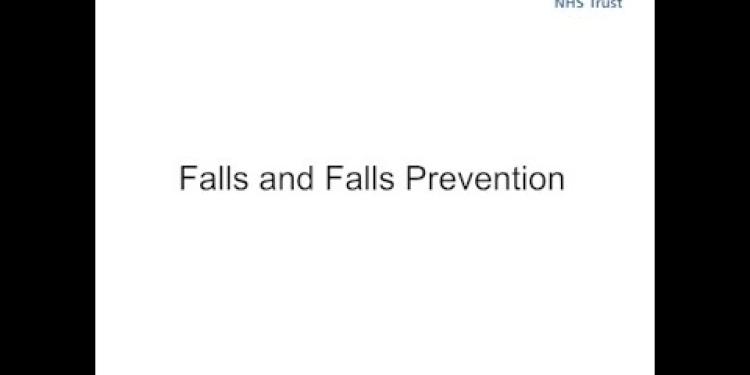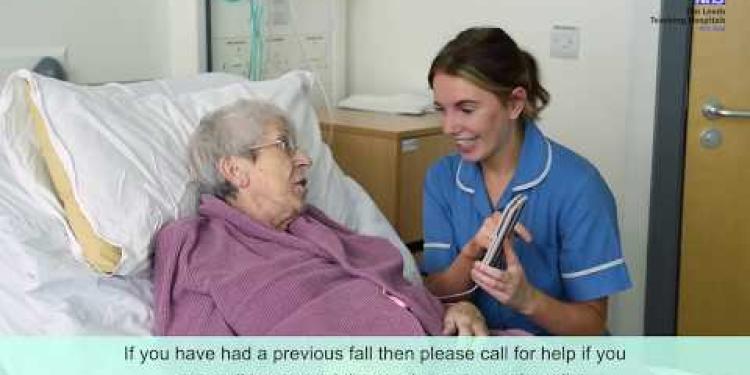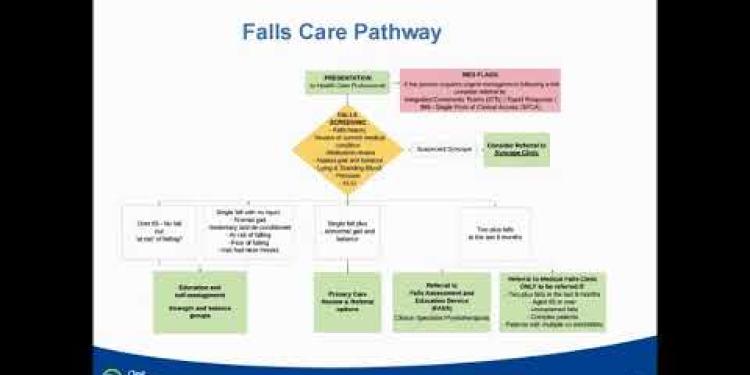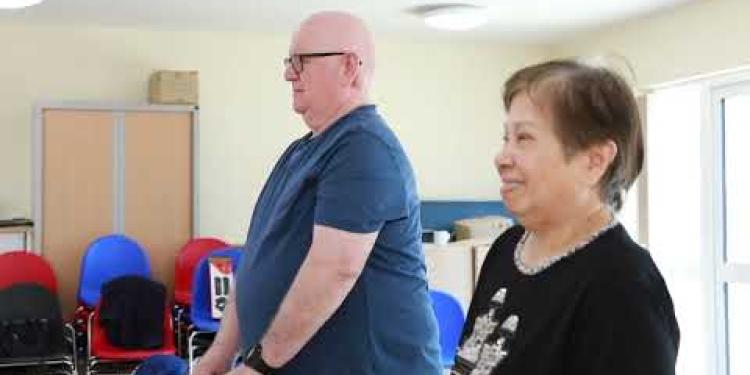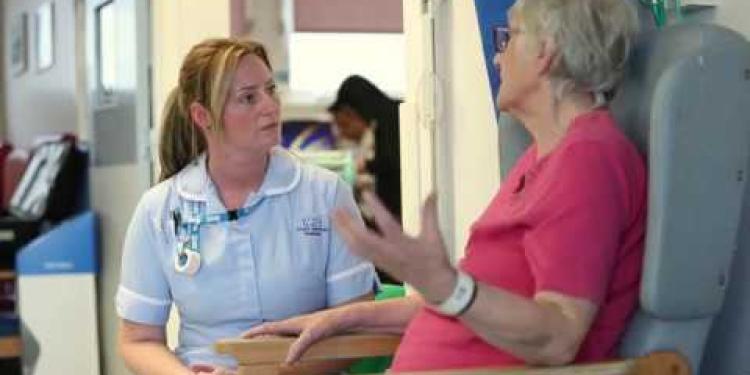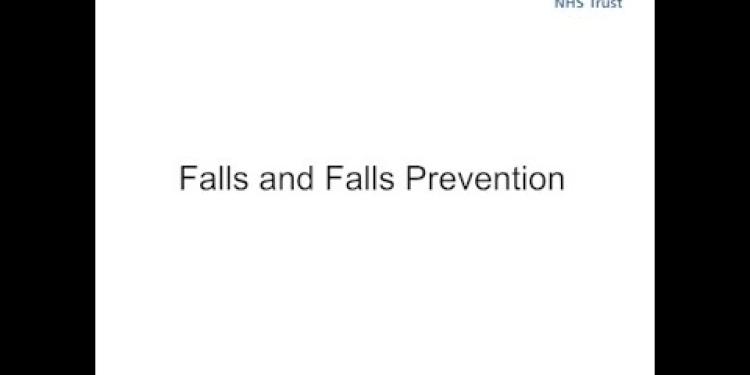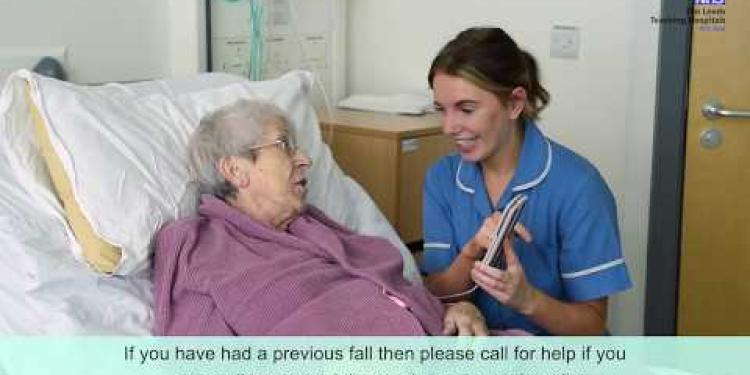Important Information On Using This Service
- Ergsy carefully checks the information in the videos we provide here.
- Videos shown by YouTube after a video has completed have NOT been reviewed by ERGSY.
- To view, click the arrow in the center of the video.
Using Subtitles and Closed Captions
- Most of the videos you find here will have subtitles and/or closed captions available.
- You may need to turn these on and choose your preferred language.
Turn Captions On or Off
- Go to the video you'd like to watch.
- If closed captions (CC) are available, settings will be visible on the bottom right of the video player.
- To turn on captions, click settings.
- To turn off captions, click settings again.
Find A Professional
Falls Prevention Podcast
Introduction to Falls Prevention
Falls are a significant concern, especially among the elderly population in the United Kingdom. The "Falls Prevention" podcast aims to educate and create awareness about the critical steps that can be taken to prevent falls and improve safety. Through engaging discussions with health professionals, caregivers, and individuals who have experienced falls, the podcast serves as a valuable resource for practical advice and preventive measures.The Importance of Falls Prevention
Each year, thousands of older adults in the UK experience falls, which can lead to serious injuries such as hip fractures, head traumas, and sometimes, even death. Falls are not just a public health issue but also have a considerable impact on the NHS and social care services. Preventing falls not only enhances the quality of life for individuals but also reduces the economic burden on healthcare systems.Identifying Risk Factors
The podcast delves into common risk factors for falls, including:- Age-related changes in balance and gait
- Medications that can affect stability
- Environmental hazards like poor lighting and clutter
- Chronic conditions such as arthritis and vision impairments
- Lack of physical activity and muscle weakness
Effective Prevention Strategies
Listeners are provided with a comprehensive range of strategies to reduce their risk of falling:- Regular physical activity to improve strength and balance, such as walking, yoga, or Tai Chi
- Reviewing medications with healthcare providers to minimize side effects
- Making home modifications like installing grab bars, improving lighting, and removing tripping hazards
- Routine eye check-ups to ensure optimal vision
- Utilizing mobility aids such as canes or walkers as needed
Real-Life Stories and Expert Insights
The podcast features real-life stories from individuals who have faced falls and successfully implemented preventive measures. Additionally, expert insights from healthcare professionals, physiotherapists, and occupational therapists provide practical advice and evidence-based recommendations. These narratives not only educate but also inspire listeners to take action in their own lives.Conclusion
"Falls Prevention" is a must-listen podcast for anyone looking to maintain their independence and enhance their safety. By addressing the risk factors, implementing effective strategies, and learning from expert insights, listeners in the United Kingdom can significantly reduce their risk of falls and lead healthier, safer lives. Whether you're an older adult, a family member, or a healthcare provider, this podcast is an invaluable guide to falls prevention.Frequently Asked Questions
What are the most common causes of falls among older adults?
The most common causes of falls among older adults include balance issues, weakened muscles, poor vision, medications that affect balance, and environmental hazards such as loose rugs or poor lighting.
How can I make my home safer to prevent falls?
To make your home safer, clear walkways of clutter, secure loose rugs with non-slip backing, install grab bars in the bathroom, improve lighting in all rooms, and ensure that frequently used items are easily accessible.
What exercises can help improve balance and prevent falls?
Exercises such as Tai Chi, yoga, and strength training can help improve balance and prevent falls. Always consult with a healthcare provider before starting any new exercise regimen.
How does poor vision contribute to falls?
Poor vision can contribute to falls by making it difficult to see obstacles and changes in the terrain. Regular eye exams and the use of corrective lenses can help reduce the risk.
Are there specific footwear recommendations for preventing falls?
Yes, wearing shoes with non-slip soles, good heel support, and a proper fit can help prevent falls. Avoid wearing slippers, high heels, or shoes with smooth soles.
Can medications increase the risk of falls?
Certain medications can increase the risk of falls by causing dizziness, sedation, or low blood pressure. It’s important to review all medications with your healthcare provider.
What should I do if I fall?
If you fall, try to remain calm. Check for injuries and if you're able, use furniture to support yourself as you get up. If you’re injured or can’t get up, call for help and try to keep warm until help arrives.
How can family members help prevent falls in older relatives?
Family members can help prevent falls by ensuring the home is safe, encouraging regular exercise, attending medical appointments, and discussing any concerns about medications or health issues with healthcare providers.
Is there any technology that can help prevent falls?
Yes, there are various technologies available, such as fall detection devices, medical alert systems, and home monitoring systems that can help in fall prevention and provide quick assistance if a fall occurs.
What should I look for in a fall prevention programme?
A good fall prevention programme should include assessments of physical health, home safety evaluations, exercise classes to improve strength and balance, and education on safe practices.
Are there any nutritional considerations for fall prevention?
Proper nutrition, including adequate calcium and vitamin D intake, can help maintain bone health and muscle strength, which are important for preventing falls.
How does alcohol consumption affect fall risk?
Alcohol can impair judgment, coordination, and reaction time, increasing the risk of falls. It's important to limit alcohol intake, especially for older adults.
What role do assistive devices play in fall prevention?
Assistive devices such as canes, walkers, and grab bars can greatly reduce the risk of falls by providing additional support and stability for those who need it.
Can chronic health conditions increase the risk of falls?
Yes, chronic health conditions such as arthritis, diabetes, heart disease, and Parkinson’s disease can affect balance, mobility, and overall strength, thereby increasing the risk of falls.
How often should I review my fall prevention plan?
It's a good idea to review your fall prevention plan at least once a year, or sooner if there are changes in your health, medications, or living environment.
Useful Links
Useful links from: Fallsafe - Put the patient first. Preventing falls in Hospital.
- NHS - Falls Prevention NHS guide on preventing falls, providing essential information and resources to keep patients safe.
- Royal Society for the Prevention of Accidents (RoSPA) Information and advice on preventing falls at home and in healthcare settings.
- Age UK - Falls Prevention Age UK provides resources and advice specifically for the elderly to prevent falls.
- NICE - Falls in Older People The National Institute for Health and Care Excellence (NICE) guidelines on preventing falls in older people.
Have you found an error, or do you have a link or some information you would like to share? Please let us know using the form below.
- Ergsy carfully checks the information in the videos we provide here.
- Videos shown by Youtube after a video has completed, have NOT been reviewed by ERGSY.
- To view, click the arrow in centre of video.
- Most of the videos you find here will have subtitles and/or closed captions available.
- You may need to turn these on, and choose your preferred language.
- Go to the video you'd like to watch.
- If closed captions (CC) are available, settings will be visible on the bottom right of the video player.
- To turn on Captions, click settings .
- To turn off Captions, click settings again.
